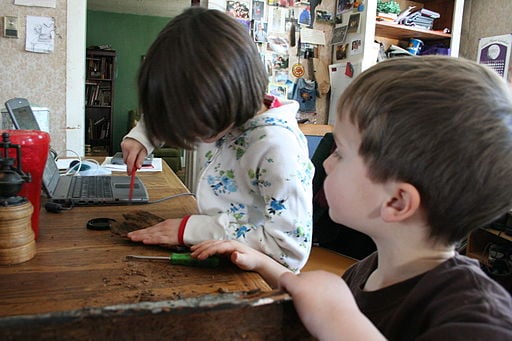All three kids came running downstairs on Monday night. They had fistfuls of cash they wanted to give us. By the time we counted it all up, they had given us $238.
This followed on the heels of Zach reprimanding us for buying tickets to California to see Jeff’s family. He would only ease up when I told him that we bought four out of five tickets with frequent flyer miles. Earlier in the night, Ezra implored us not to eat out because it was too much money. What, you might wonder, would cause three healthy American children to voluntarily give up travel, food, and money?
A dog, of course. They are saving up money for their first dog. And they are on a mission to earn and save money.
In the last year, the three kids, ages eight, ten and fifteen, have earned more than two thousand dollars. They sold homemade cookies, lemonade, and ice cream ($500); they ran a summer camp for young children ($800); they harvested, packaged, and sold honey from our hive ($250); and Nafisa babysat. Some of that was used to recoup expenses, and they gave away just over half of it. Still, they have enjoyed earning and spending that money far more than they have enjoyed their allowance or birthday money.
This entrepreneurial spirit is new to me. My entire adult life I have only worked for non-profit organizations. I was never opposed to making a lot of money, but it never motivated me. Something has changed, though, since we started homeschooling, and it seems to be affecting all of us.
I’m not sure how to describe it, but I think it has to do with a way of understanding the nature of work. The boys are not working to get good grades, or to get into a good college. They are working because working is good, in and of itself. And working can be good because it allows you to buy things, for yourself and for others, that are good. And working is good because it allows you to produce things, for yourself and others, that are good. Traditional school can lead to all of that, but the timeframe is drawn out and it’s often hard to see the connections between work and the desired outcome.
Yes, sometimes they are working because I am turning red with rage and threatening them with years locked in their bedroom. Still, there are moments when they are working hard on something just because they want to work on it or just because they are trying to finish something to sell it. For example, they wanted to study bees because bees are incredibly cool. And the best way to study bees is to have a hive. But a hive is expensive, and they needed to figure out how to pay for it. So they bought a hive with the expectation that they would be able to sell the honey. They spent two years, raising, caring for, and learning from the bees. They harvested the honey, designed the labels, met with the local honey store owner and agreed to sell honey there. They baked with honey, drank tea with honey when they were sick, gave honey as gifts, and sold honey to our neighbors and friends. It was good.
Even I have become interested in making money for the first time in my life. I am renting out our house through AirBNB. We wanted $10000 to pay for summer camp and an academic intervention to address the boys’ learning disabilities, and I will make that by sharing our house with others. Working to make that happen feels good. I always loved teaching and it certainly felt like a good. But it didn’t feel good because of the money. While I will make less money renting our house this year than I did as a teacher, I love AirBNB precisely for the money it will bring our family.
It turns out that entering the world of homeschooling, where people step outside the box a bit, encourages this cottage industry thinking. In a world where hedge fund managers make millions and some teachers have to take a second job to buy a house, in a world where corporate lawyers have several homes and veterans can’t get the mental health care they need, in that world money always felt arbitrary to me. In this world, and in the worlds of so many here and around the globe that I previously knew little about, money can be more clearly connected to work and the goodness of work. I love spending money at the farmer’s market, and I love seeing my neighbors pay a dollar for a cup of delicious, homemade, strawberry ice cream, and I love earning money by welcoming people into our home. The directness of it all is empowering in a way that’s hard for me to understand, even as I experience it.
So I will proudly drive with our family to Maine at the end of the month to hand the breeder a big wad of crumpled dollars so that we can pick up a hypo-allergenic dog that our children are working so hard to boy. And it will be good.











